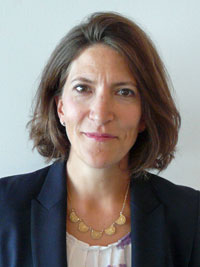Mary Starks is Director of Competition at the Financial Conduct Authority (FCA) where she interacts regularly with Government and Parliament, the financial services industry, the fintech community, consumer advocates, legal and other advisers, as well as her international counterparts. She was recruited (together with her job share partner) to start a new competition division, leading the organisation in meeting its statutory objective to promote competition in the interests of consumers, and together they built this up to its current strength of 90 people. Mary studied politics, philosophy and economics at the University of Oxford, followed by studying economics at the London School of Economics.

“…if an organisation can get the right job-share partnership in place, it gets two brains, two sets of accumulated experience, and the more productive halves of two people’s weeks for the price of one. It’s also a very enjoyable way to work, particularly as a senior leader – you share the highs and the lows and avoid the “loneliness of leadership”…”
From economics into leadership
I started my career at the Bank of England, and have since worked in economic consultancy, and at competition authorities in the UK and New Zealand. I have worked part time since 2005, when my first child was born. I started as an economist (applying microeconomics in regulation and competition policy) but have moved into leadership / management over time. I joined the FCA in 2013, in a job-share with Deb Jones.

My role at the Financial Conduct Authority on a day to day basis
Most of my time is spent on management (of people, projects, risks, change…). There’s also lots of back to back meetings! I do less analysis or writing than earlier in my career. I do set aside time to read though, partly to keep up with developments in my field, but I also just need some quiet time. My role also calls for strategic thinking, which tends to strike when I’m in the shower or on my bike, but only if I’ve put enough time into reading, talking to interesting people, attending conferences etc. to feed my brain.
The FCA’s work around disruptive innovation and the regulation of emerging areas like fintech
The work on fintech and disruptive innovation is a core part of the mandate to promote competition and a key priority for the FCA. Regulation is, almost by definition, a barrier to entry – part of my job is to make sure the barrier is no higher than it needs to be, and does not disproportionately exclude small or innovative businesses.

My background as an economist – a structured approach to thinking and a habit of intellectual rigour
I am ambivalent about my background as an economist! With hindsight, I trained in an era when the discipline was in a state of dangerous over-confidence – it felt like engineering, when it should have felt like a mix of weather forecasting and ethics. But the training did give me a structured approach to thinking and a habit of intellectual rigour, which has stood me in excellent stead.
My approach these days is more multi-disciplinary – economics makes a big contribution to what we do at FCA but so does psychology, politics, history … and I job-share with a lawyer!
How a gender-balanced and inclusive workforce creates value
Whilst economics, tech and financial services are undoubtedly male-dominated, financial regulation is less so – FCA has a good gender balance at all levels up to and including the Board. My early career was in male-dominated teams – I enjoyed those jobs and worked with some fantastic colleagues. But more recently I have worked in a balanced environment, which I prefer.
At a personal level, the main benefit is that it’s just easier to be myself (and it’s really tiring not being yourself at work). At a policy wonk level, the benefits of a diverse workforce have been well articulated and evidenced in, for example, the McKinsey report, Diversity Matters, or the Jayne-Anne Gadhia review of women in UK financial services.

Career advice for women in economics
I used to be shy about asking for career advice, which is silly – I should have asked for more. One obvious but useful piece of advice was to try to write a career plan. It doesn’t need to be a Lyndon Johnson-style strategy to get to the White House by age 55. It doesn’t even need to look much like a plan. But it is important to be specific about what you want from a job, what you are good at, and where those things might come together in one place.
Challenges and opportunities for organisations using job-sharing
The main challenge is that it’s hard to find the right combination of people at the right time in the right place, so it is important that organisations consider the full range of flexible working approaches, of which job-sharing is only one.
That said, if an organisation can get the right job-share partnership in place, it gets two brains, two sets of accumulated experience, and the more productive halves of two people’s weeks for the price of one. It’s also a very enjoyable way to work, particularly as a senior leader – you share the highs and the lows and avoid the “loneliness of leadership”.

Research by Timewise found that only 6% of quality jobs are advertised on a flexible basis, whereas 47% of the workforce want to work flexibly in some way – many organisations are missing a big opportunity.
Coming up next for me and the FCA
2017 looks like a busy year for the FCA, and for the Competition Division in particular. We are working on a range of areas, from retail banking through to asset management, and our 2017 business plan will set out some more detail of this. I’m also very excited about the work that our new Chief Executive, Andrew Bailey, is doing around the FCA’s future mission, which has opened a really interesting conversation about how the FCA can make the biggest difference to markets and consumers. There are some difficult questions to consider in this area, and I am pleased to see us approach this head on.
https://www.linkedin.com/company/financial-conduct-authority





